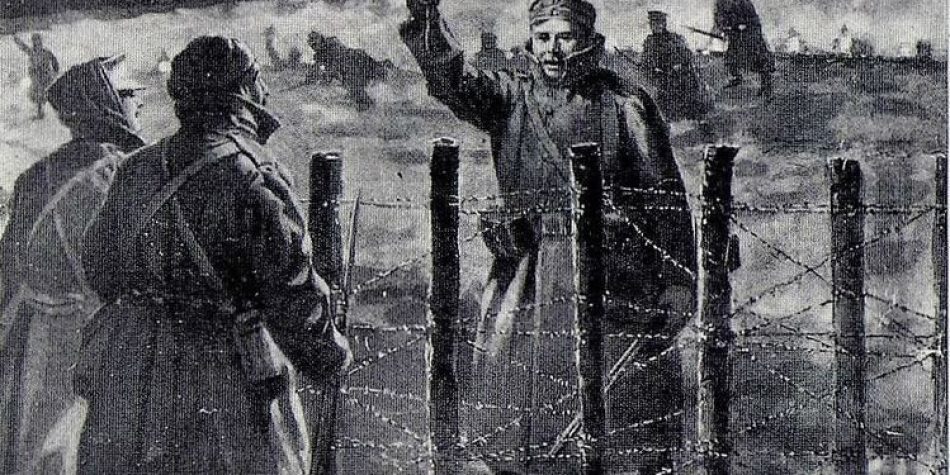Amid the joy of the season, I look out the window to see snow. The tree is up, my children are asking for me to read them Christmas books, and there’s a seemingly never-ending parade of sweets and goodies from dear friends on the doorstep. Deeper still, it’s a unique time when apologies mean a little more, and healing is a little easier. The season of peace, reconciliation, and kindness has arrived.
And yet, in spite of it all, the culture wars rage on.
The latest skirmish revolves around Mr. Jeff T. Green, tech entrepreneur and officially now, a former member of The Church of Jesus Christ of Latter-day Saints. Not content to merely exit, Mr. Green has also disseminated a pointed critique that has garnered international press coverage, alleging the Church is exploiting the poor and “doing harm” to the world.
There is a story of a Christmas Eve ceasefire during one of the world wars. Spurred by universally-known hymns, soldiers put down their weapons. In a moment of humanity, they looked around to see their common fraternity and the utter waste of the destruction all about them.
How does one maintain goodwill over a conflict this intense? I hold my faith sacred–and dear. When someone attacks it, is it not right to fight back? To go for the rhetorical jugular, and traffic in jabs and zingers and snarky gotchas?
We have been commanded otherwise by our gentle Lord and His servants, and we need to aspire for something better. As our beloved apostle, now officially an angel, Neal Maxwell once summarized:
Therefore, brothers and sisters, quiet goodness must persevere, even when, as prophesied, a few actually rage in their anger against that which is good (see 2 Ne. 28:20). Likewise, the arrogance of critics must be met by the meekness and articulateness of believers. If sometimes ringed by resentment, we must still reach out, especially for those whose hands hang down (see D&C 81:5). If our shortcomings as a people are occasionally highlighted, then let us strive to do better.
Civility is among my highest values—in part because of this specific teaching. My hope is to extend grace to Green and others who find themselves considering separating from a faith they once found precious. This goodwill is part of what Jesus himself preached—and what angels prophesied of at His coming.
“Glory to God in the highest heaven, and on earth peace to those on whom his favor rests” (Luke 2:14, NIV).
Goodwill can be difficult when people leave the Church. My faith is precious to me. It is somewhat easier to extend grace since I’ve learned about “deconversion.” As Christopher Cunningham wrote a year ago when James Huntsman departed:
Leaving a once precious and closely-held conviction, what researchers call ‘deconversion,’ can be spiritually and emotionally taxing… . When former members leave a totalistic faith, suggests the late Bryan R. Wilson, an Oxford-based sociology of religion scholar, they can be prone to act, “from a personal motivation to vindicate themselves and regain their self-esteem, by showing themselves to have been first a victim but subsequently to have become a redeemed crusader.”
This is no attack on Green; it simply helps me make sense of the world. I’ve felt the same myself after leaving a political party or a high school club: it’s just so much easier to complain about everything that was wrong with my former comrades. Seeing myself and my own inclinations in all this helps me be a little more patient with others.
My dad once taught me that any town of 100 will have a jail. There was probably something in that about human nature, but his goal was statistical, I think. In a church of 16 million, some will leave. I wish they wouldn’t. I love this church with my whole heart. And yet, it is the reality of any organization with so many members that some will go and some will stay and it’s time for me to come to terms with that.
I sometimes wonder if we don’t need a better narrative about “leaving well.” Maybe church members could more sincerely wish someone well when they leave—even, perhaps, amid tears. And those who leave could pay tribute to what they had gained from their faith, and share real gratitude for it—even with all the differences they have. Whatever the details, this would involve greater maturity on both sides. Church members would need to learn to lower their defenses, and love more deliberately. Those who leave are not our enemies, but our brothers and sisters. They will be welcomed back, and if they never return our hearts will still feel after them. Those who leave would need to stretch in similar ways.
I’ve wondered if perhaps the tribal dynamics of in-groups and out-groups are all part of the puzzle. I am frank to say that this case was a disappointment in that regard, for while Green certainly won’t be the last to leave, he could have been the first on a better path. A missed opportunity, I suppose.
And so, while Christmas has come, the sun will rise and set and rise—and the war will resume.
I hope that this little missive is an imperfect offering of peace—or at least, ceasefire. In the coming days, it will be important to respond to Mr. Green’s impassioned public assertions in greater depth. There will be direct engagement on important topics, but our ‘muskets’ will be very, very precisely aimed: not at Green, nor at any who decides to leave the Church, but at the ideas with which we disagree.
And I don’t intend to pull any punches.
I hope, for example, that someone will further address his statement that “the Church is actively and currently doing harm.” Odd, given my own experience. This church gives me meaning, purpose, and joy. Setting aside humanitarian efforts, or educational subsidies (from which both Green and I have tangibly benefitted) the greatest good the Church provides is deeply personal, subjective, and spiritual; and even he cited his upbringing as positive. His statement deserves further interrogation. I hope someone will mention the Church’s cattle ranches, and how they are used to stock bishop’s warehouses for the poor.
My dear friends who have left the Church make me careful about critiquing Green. I love them. I see them in him.
But I apparently know too few journalists. I have very little patience with the way they hide behind “just doing my job” when the narrative-spinning is so thick.
A friend found out about Green in the pages of the Salt Lake Tribune, and asked me, “will this be a “hate-billionaires” or “love-billionaires” story?” He genuinely didn’t know. Another friend said, “I look forward to the Salt Lake Tribune consistently applying the rule that we should pay very close attention to what billionaires think and say and do so solely on the basis of their wealth.”
It’d be interesting, too, to see the difference in Green’s daily lifestyle compared to any of our senior church leaders. That would be some great investigative reporting.
I won’t hold my breath.
I’ve wondered what The Tribune’s headline pitch meeting must have gone like: “Man who uses money wisely angry at church that also uses money wisely.” “Shocking: Man who hasn’t attended church in ten years announces he’s not biggest fan of said church.” Bluntly, it seems that The Trib is quite pleased with itself for publishing what amounts to “I’ve unilaterally decided that this divorce will not be amicable, but trust me, I’m, like, super reliable about the real problems in our marriage.”
And now, I’ve gotten snarky again. Yes, I’m frustrated by some of this. It won’t hurt me to get a few days to think and cool down, and it’s good to focus on the most important things anyway.
For now, a moment of peace. And a few things in parting:
Tears of well-wishing. The prodigal son’s father shed tears of compassion and joy upon his son’s return; I wonder if he shed tears of grief at his departure. I wonder, too, if his son didn’t dismiss those farewell tears in his own frustration—the addled sentimentality of a man steeped in fairy tales and superstitions.
Forgive my sentimentality, then. My tears are tokens of desire on behalf of those who leave. Jesus described the kingdom of heaven as a pearl of great price—worth everything. That is how I feel about this church. It gives meaning and color and texture to life. I believe it to be what it claims to be. The genius of its totalizing requirements—in the way that it calls forth my entire heart and soul—is that I find in it my cause and my mission.
I wonder if President Nelson will weep over this. It would not surprise me. His grief would be the same, of course, independent of wealth—no matter what news coverage may imply. And ultimately, though grieving those who leave, the Church will move forward. The true wealth of the Church has always been the faith of its members. No unhallowed hand will stop the work from progressing—and while Green’s time and talents will be missed, he has no more power than I to stop it.
Recommitting. The tribal instinct, especially when someone switches sides, is to pounce: multiplying the accusation and acrimony. And many will not think well of Mr. Green in days to come. Yet I hope that most of my fellow saints are kind, and think that’s actually a safe bet—although if every town of 100 people has a jail, every ward of 200 has a member who missed out on tact in the premortal existence. I know from friends who have left about what insensitive experiences look like. He’ll get some of that. And I’m sorry for it.
My fears aren’t just of insensitivity, however. Rather, the tribal element here is one of justification: if Green’s acted despicably, it’s easier for a faithful saint to dismiss his leaving. Similarly, if the Church is terribly wrong, Green’s just a noble whistleblower. Soothing consciences in this way is inappropriate: whether over-blaming the Church to justify leaving or over-blaming Green to justify staying. Such is not helpful. It isn’t Christlike.
I’ve noticed that everyone needs a cause. We have politics and religion and bowling leagues, and we live for the purpose these give us. I hope that Green will find other good causes, and engage in them earnestly.
Donating millions is a good start, but it’s not anywhere close to enough. God is not satisfied with 90%, and he doesn’t denominate in dollars. He needs our all, our mind, our heart, our very will itself.
Inasmuch as we all need a cause, mine is Christ. When I first read about Green’s story, my distinct impression was to let this be the impetus for recommitting to my discipleship. Yes, that means aspiring to be Christlike—kind, patient, and compassionate—but it also means holding to truths that I hold dear. Being like Jesus means living His commandments—and espousing them. As others distance themselves from the gospel, I intend to embrace it more fully; to live its truths a little more fearlessly, and embody its virtues with even less apology.
Prophecies brought to pass. I have tried to be kind so far, while still being earnest. That’s hard. I disagree with Jeff Green deeply–even fiercely–on these things. And yet, I have an obligation to live up to Elder Maxwell’s counsel. Is Jeff Green the arrogant critic of which this good apostle once spoke? That is not for me to say. Green’s choices will determine whether Elder Maxwell’s prophecies will be fulfilled by Jeff Green.
And on those lines, another quote of Elder Maxwell—in fact, the immediately preceding paragraph from the same talk—needs mentioning here too:
Church members will live in this wheat-and-tares situation until the Millennium. Some real tares even masquerade as wheat, including the few eager individuals who lecture the rest of us about Church doctrines in which they no longer believe. They criticize the use of Church resources to which they no longer contribute. They condescendingly seek to counsel the Brethren whom they no longer sustain. Confrontive, except of themselves, of course, they leave the Church, but they cannot leave the Church alone. Like the throng on the ramparts of the “great and spacious building,” they are intensely and busily preoccupied, pointing fingers of scorn at the steadfast iron-rodders. Considering their ceaseless preoccupation, one wonders, Is there no diversionary activity available to them, especially in such a large building—like a bowling alley? Perhaps in their mockings and beneath the stir are repressed doubts of their doubts. In any case, given the perils of popularity, Brigham Young advised that this “people must be kept where the finger of scorn can be pointed at them” (Discourses of Brigham Young, sel. John A. Widtsoe [1941], 434).
Once again, whether that describes Jeff Green or not will ultimately be up to Jeff Green. President Hinckley took on a similar topic in 2000. Beginning his talk focused on gratitude for the blessings of his life, he briefly departs from that theme to talk about critics of the Church:
On the other hand, during these years I have come to know of the mean and contemptuous ways of our critics. I think the Lord had them in mind when He declared: “Cursed are all those that shall lift up the heel against mine anointed, saith the Lord, and cry they have sinned when they have not sinned before me, … but have done that which was meet in mine eyes, and which I commanded them.” “… Those who cry transgression do it because they are the servants of sin, and are the children of disobedience themselves. …” “Wo unto them.… “Their basket shall not be full, their houses and their barns shall perish, and they themselves shall be despised by those that flattered them” (D&C 121:16–17, 19–20).
President Hinckley ends his parenthetical solemnly: “We leave to Him, whose right it is, judgments that may come to those who oppose His work.”
I can’t judge Jeff Green because I don’t know his heart. And yet, while I cannot judge, that is not the same as suggesting that Jeff Green has no judge. I believe that we will all be accountable before God in a coming day. I pray that Green does not become another voice fulfilling the prophecy of Elder Maxwell, or the lament of President Hinckley. I similarly pray that this man will allow every shred of good that his former faith has done for him to fill his heart and mind with gratitude—and that his life can perhaps somehow still be a tribute to the values and aspirations of his former faith.
Thank God, indeed, for the gift of His son—about whom the angels sang “peace on earth, goodwill to men.” On that night, at least, Christ brought just that. It’s been dark and terrible before—and peace has broken out. My heart hopes for the day when a peace to end all war does likewise; not merely a peace between countries, but a peace between hearts.
Editor’s Note: Check out the other responses from Meagan Kohler and Michael Peterson here.
















